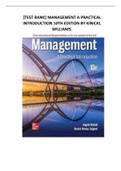[TEST BANK] MANAGEMENT A PRACTICAL
INTRODUCTION 10TH EDITION BY KINICKI,
WILLIAMS.
, CHAPTER 1: THE EXCEPTIONAL MANAGER: WHAT YOU DO, HOW
YOU DO IT
1) At times, to be efficient in management means NOT using resources in the most
costeffective
way.
⊚ true
⊚ false
2) Organizations can gain a competitive advantage simply by matching their
competition in
terms of cutting costs and responsiveness to employees.
⊚ true
⊚ false
3) Innovation in business is defined as seeking ways to deliver less costly goods but in
similar ways, maintaining employee morale.
⊚ true
⊚ false
4. At times, to be efficient in management means not using resources the most cost-
effectively.
FALSE
Efficiency is the means of attaining the organization's goals. To be efficient means
to use resources such as people, money, and raw materials wisely and cost-
effectively.
AACSB: Analytical Thinking
Accessibility: Keyboard Navigation
Blooms: Remember
Difficulty: 1 Easy
Learning Objective: 01-01 What are the rewards of being an exceptional manager?
Topic: Management
5. Effectiveness mean to use resources—people, money, raw materials, and the like—
wisely and cost-effectively.
FALSE
, To be efficient means to use resources such as people, money, and raw materials
wisely and cost-effectively. To be effective means to achieve results, to make the
right decisions, and to successfully carry them out so they achieve the
organization's goals.
AACSB: Analytical Thinking
Accessibility: Keyboard Navigation
Blooms: Remember
Difficulty: 1 Easy
Learning Objective: 01-01 What are the rewards of being an exceptional manager?
Topic: Management
6. Having airline representatives apologize for service difficulties is efficient, but it's
not effective when customers are angry and less inclined to continue doing
business.
TRUE
Airlines handle service complaints by routinely saying "I'm sorry," which may be
efficient for the airlines—even when the apologies are accompanied by gift cards,
credits, and loyalty points—since it's a lot cheaper than, say, adding more
reservation agents, flight crews, baggage handlers, and, of course, airplanes. But
it's not effective if it leaves customers fuming and less inclined to continue doing
business.
AACSB: Analytical Thinking
Accessibility: Keyboard Navigation
, Blooms: Understand
Difficulty: 2 Medium
Learning Objective: 01-01 What are the rewards of being an exceptional manager?
Topic: Management
7. Good managers create value.
TRUE
Good managers create value. The reason is that in being a manager, they have a
multiplier effect: their influence on the organization is multiplied far beyond the
results that can be achieved by just one person acting alone.
AACSB: Analytical Thinking
Accessibility: Keyboard Navigation
Blooms: Understand
Difficulty: 2 Medium
Learning Objective: 01-01 What are the rewards of being an exceptional manager?
Topic: Management
8. Lower-level managers typically make less than $10 million in their lifetime, but
they do earn fairly good incomes compared with most workers.
TRUE
Managers farther down in the organization usually don't make as much as CEOs,
but they do fairly well compared with most workers. At the lower rungs, managers
may make between $35,000 and $60,000 a year; in the middle levels, between
$45,000 and $120,000.
AACSB: Analytical Thinking
Accessibility: Keyboard Navigation
Blooms: Analyze
Difficulty: 2 Medium
Learning Objective: 01-01 What are the rewards of being an exceptional manager?
Topic: Management
9. Studying management is likely to help you understand how to deal with
organizations from the outside, relate to your supervisors, interact with coworkers,
and manage yourself in the workplace.
TRUE
There are several benefits of studying management that you can use before being
a manager. You will better understand how to deal with organizations from the
outside, how to relate to your supervisors, how to interact with coworkers, and how
to manage yourself in the workplace.
AACSB: Analytical Thinking
Accessibility: Keyboard Navigation




